#jan nemec
Text

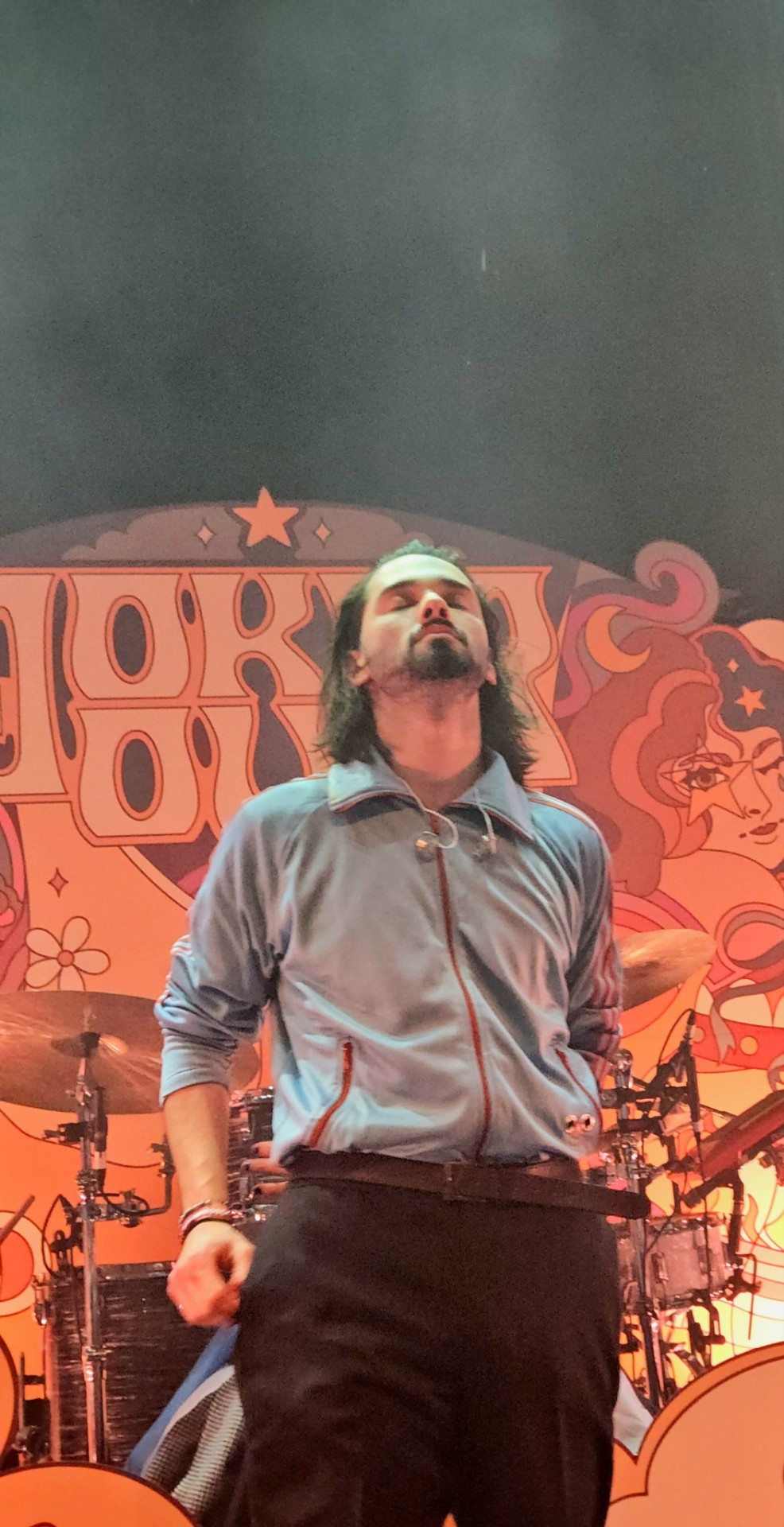
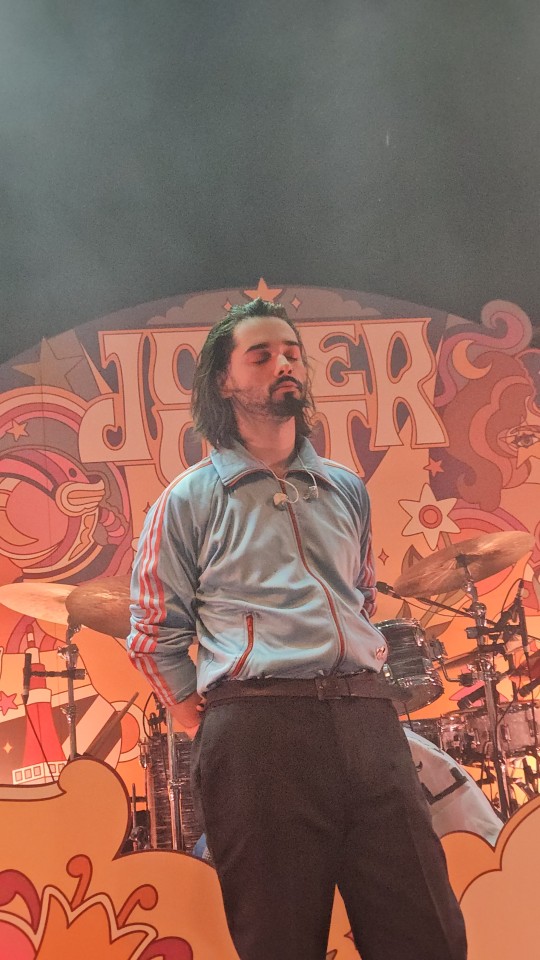

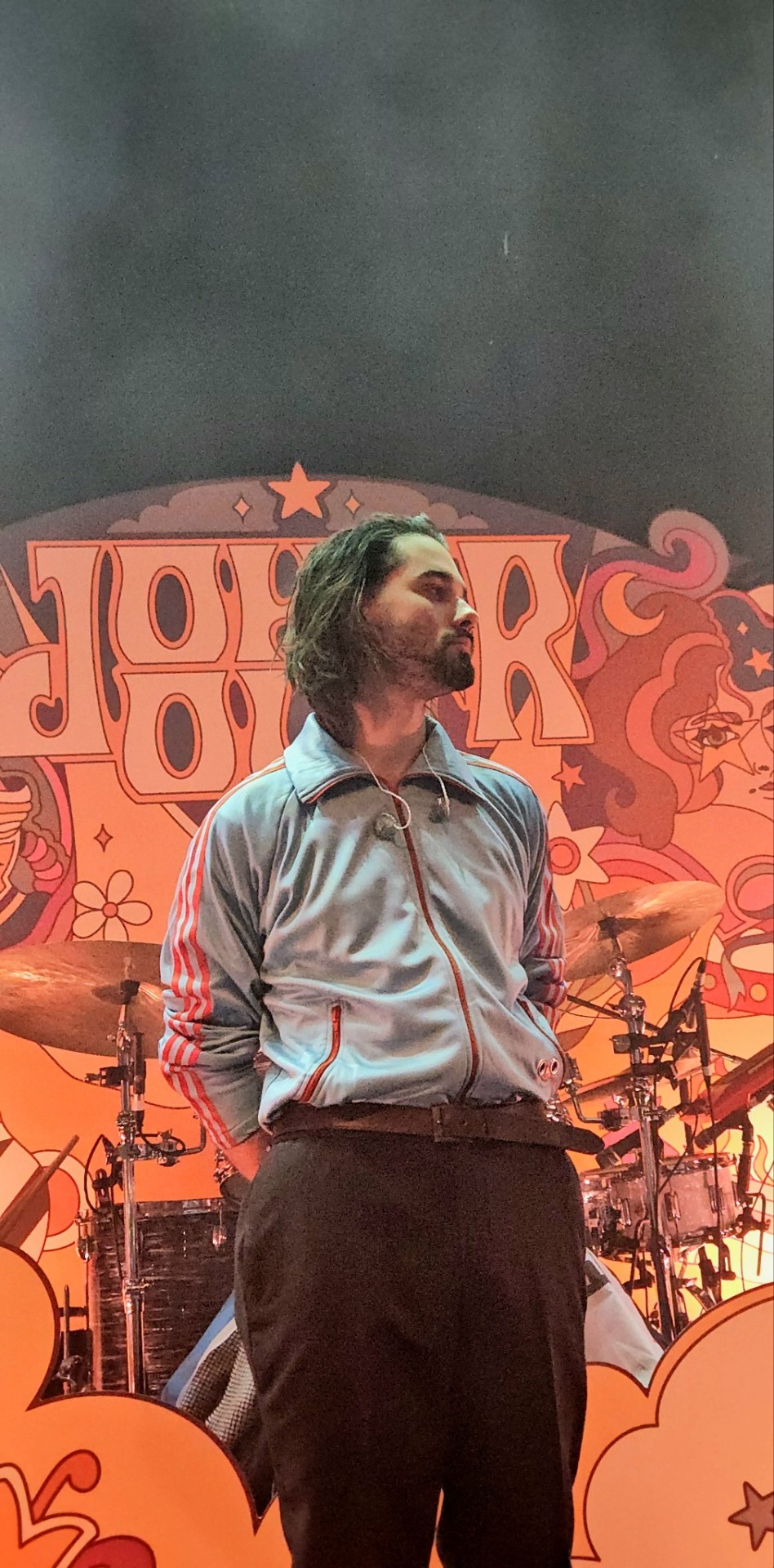
Jan je bog
105 notes
·
View notes
Text


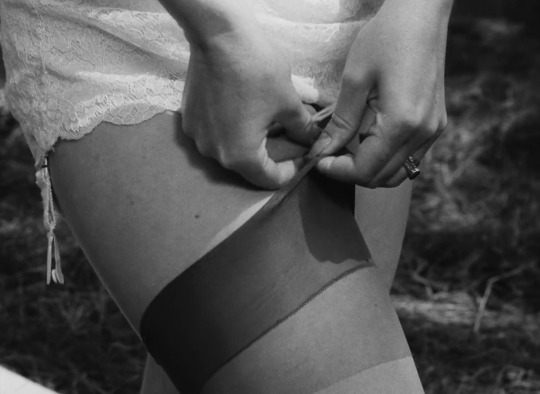

A Report on the Party and Guests (O slavnosti a hostech) - Jan Němec - 1966 - Czechoslovakia
38 notes
·
View notes
Text


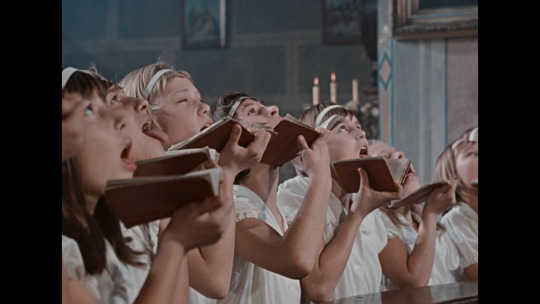
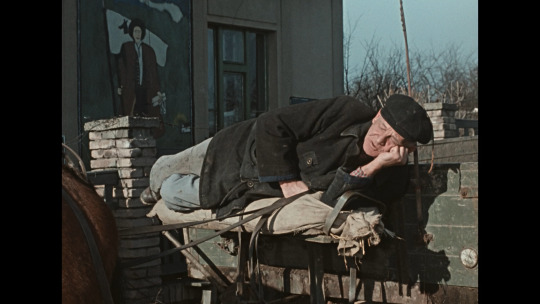
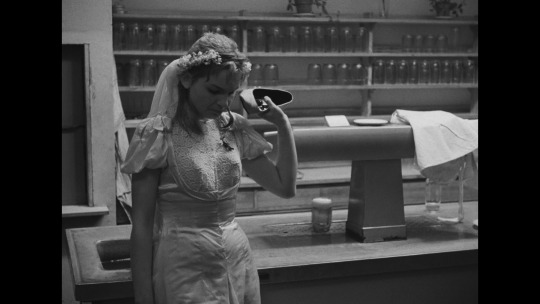
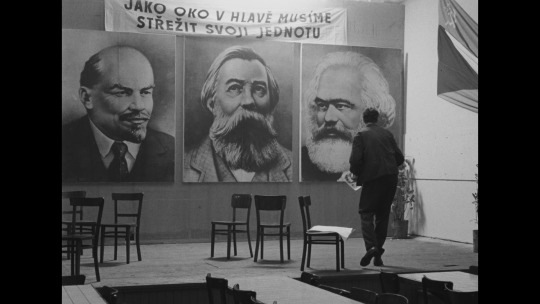

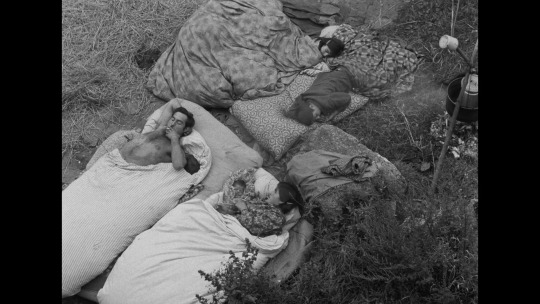
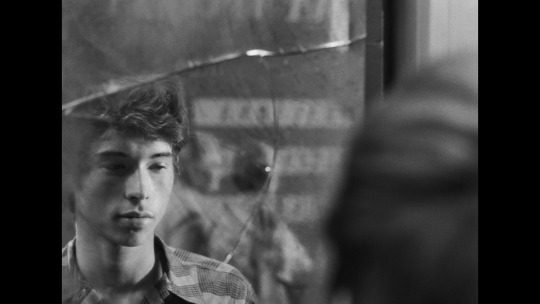

Pearls of the deep (Vera Chytilová & Jaromil Jires & Jirí Menzel & Jan Nemec & Evald Schorm, 1965)
#vera chytilova#pearls of the deep#jaromil jireš#jiri menzel#jan nemec#evald schorm#czech cinema#czechoslovak new wave#czechoslovak cinema#czechoslovakia#female filmmakers#female directors#female directed films#women in film#female film directors
8 notes
·
View notes
Text

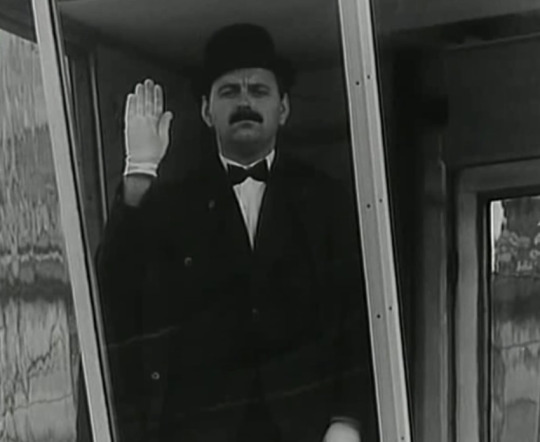
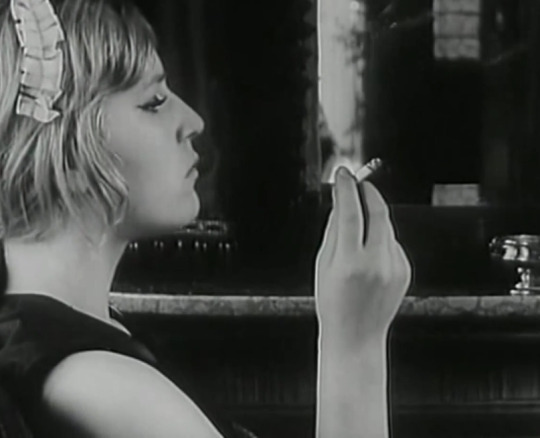
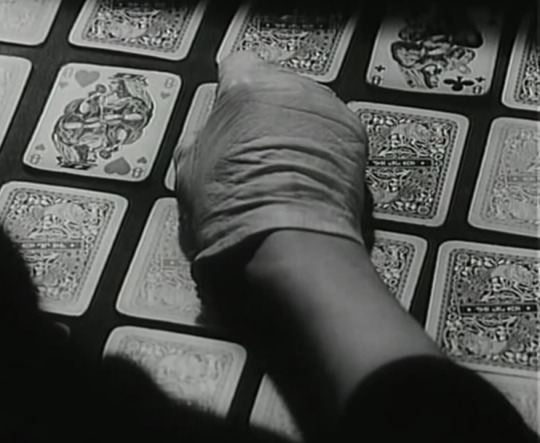
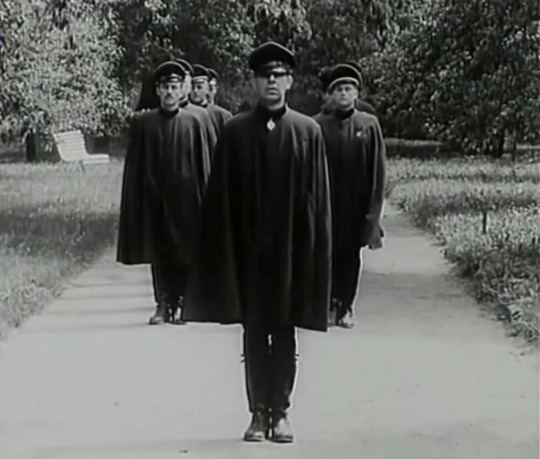
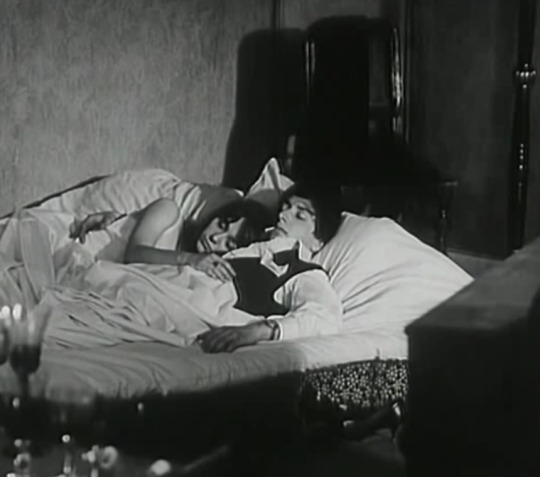


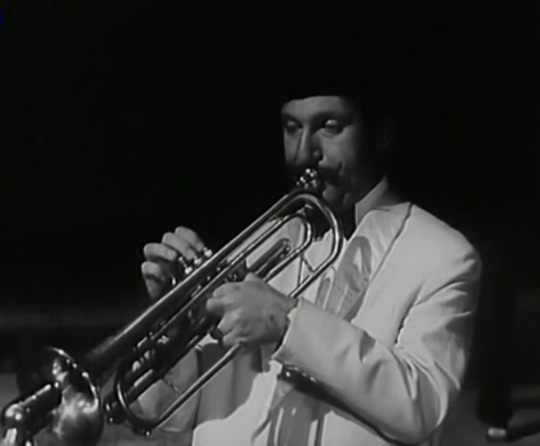
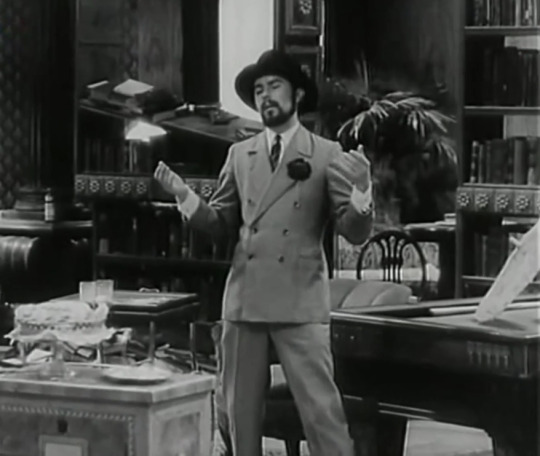


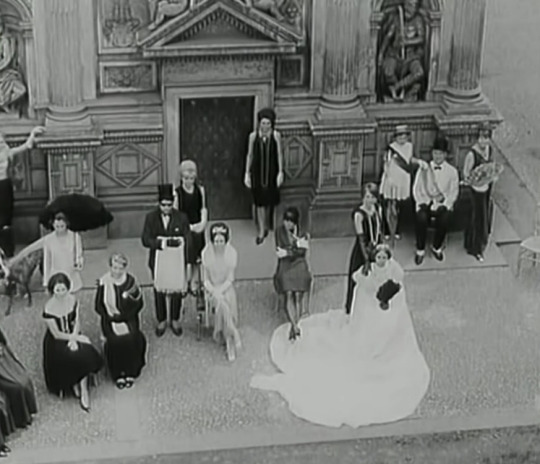
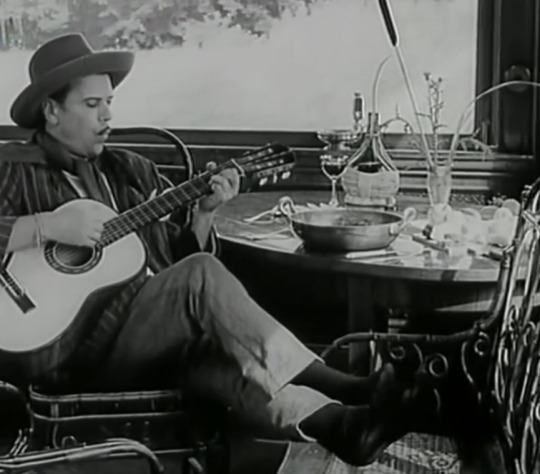
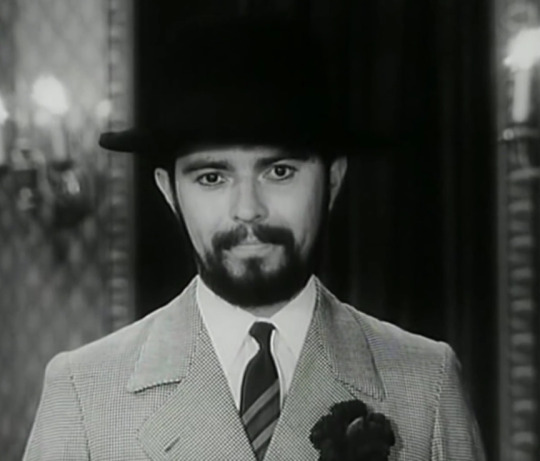
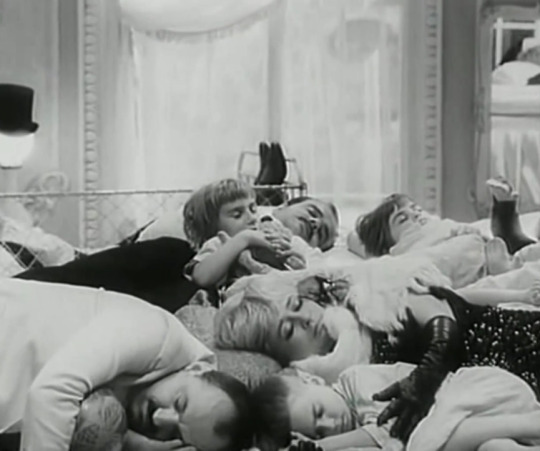
Martyrs of Love (1967)
3 notes
·
View notes
Text

Evald Schorm, Pavel Bošek, and Karel Mareš in A Report on the Party and Guests (1966), directed by Jan Němec (July 12, 1936 – March 18, 2016).
10 notes
·
View notes
Text



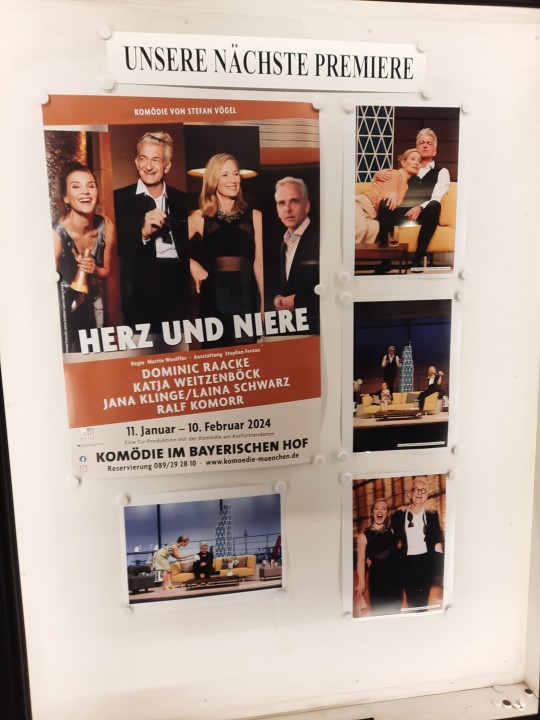
Ein Vorteil davon, in einer sehr kulturellen Großstadt zu leben: man bekommt jede Menge Gelegenheiten, seine Tatort-Blorbos life on Stage zu sehen ^^ Im November war ich mit @chrisoels bei einer wundervollen Lesung mit Udo Wachtveitl, im Dezember bei einer sehr witzigen Lesung mit Axel Prahl und Jan Josef Liefers und heute bei einer bitterbösen Komödie mit Dominic Raacke.
Nächste Woche bin ich dann bei einem Konzertabend von Miroslav Nemec und im Februar bei einer Lesung mit Harald Krassnitzer. ^^
Am kommenden Freitag seh ich noch ein Theaterstück von und mit einem Darsteller aus "München 7" (Winfried Frey) und demnächst eine Lesung mit Kommissar Rex' Herrchen Tobias Moretti ^^
Zitat von Udo vor seiner Lesung: "I brauch eigentlich keine Lesebrille. Aber i schau halt verboten gut aus damit!" 🤣
12 notes
·
View notes
Note
Hi :)
Bin gerade über deinen Theorie-Post zu Ricks Tatort-Ausstieg gestolpert (wild!) und wollte bei einem Punkt mal genauer nachhaken: „Die ARD ist aktuell auf dem Spartripp, hat ganze Teams gekappt und mehrere Ermittler rausgeschmissen.“
Hast du dazu noch weitere Bespiele? Aber wow, gleich ganze Teams … wann waren die das letzte Mal so krass drauf 😳🙈
Ja, hab ich tatsächlich. Dass die ARD sparen muss, haben deren Pressesprecher schon mehrfach gesagt. Zum Beispiel, als angekündigt wurde, dass das Mainzer Team aufgelöst wurde oder in Ludwigshafen Stammcast rausgeschmissen wurde. Hier mal eine Übersicht aller aktuellen Teams... von 2022 bis jetzt. Nicht alle wurden von der ARD rausgeschmissen, aber grade ist wirklich seeehr viel Verlust.
BERLIN: 2022 stirbt Meret Becker als Nina Rubin den Serientod.
BREMEN: Dar Salim ist schon nach zwei Folgen nicht mehr als Mads Andersen dabei. 2023 wird verkündet, dass er endgültig raus ist.
DORTMUND: 2022 stirbt Anna Schudt als Martina Bönisch den Serientod. 2024 ist Rick Okon möglicherweise zum letzten Mal als Jan Pawlak zu sehen. (Somit wahrscheinlich auch Ende für Jana Giesel als Mia Pawlak und Angelika Bartsch als Britta Tremmel.
DRESDEN: Auch Karin Hanczweski ist raus. Sie ist 2025 zum letzten Mal als Karin Gorniak zu sehen.
FRANKEN: 2022 war Andreas Leopold Schadt zum letzten Mal als Sebastian Fleischer zu sehen. 2024 tritt Dagmar Menzel zum letzten Mal als Paula Ringelhahn auf.
FRANKFURT: (nichts bekannt)
GÖTTINGEN: (nicht bekannt)
HAMBURG UND UMGEBUNG: Franziska Weisz spielt 2024 zum letzten Mal Julia Grosz, weil die ARD ihre Rolle als auserzählt erachtet.
HAMBURG (TSCHILLER): 2023 wird verkündet, dass der Tatort mit Til Schweiger nicht fortgesetzt wird.
KIEL: Axel Milberg ist 2025 zum letzten Mal als Klaus Borowski zu sehen.
KÖLN: (nichts bekannt)
LUDWIGSHAFEN: Die ARD verkündete, dass Annalena Schmidt (Edith Keller) und Peter Espeloer (Peter Becker) wegen Sparmaßnahmen 2023 zum letzten Mal dabei sind.
MAINZ: 2023 verkündet die ARD, dass der Tatort um Heike Makatsch aus Kostengründen noch im selben Jahr aufgelöst wird.
MÜNCHEN: Udo Wachtveitl als Franz Leitmayr und Miroslav Nemec als Ivo Batic denken an ihre Tatort Rente, sind aber auf jeden Fall noch bis 2025 zu sehen. 99 oder 100 Folgen voll machen ist wohl das aktuelle Ziel.
MÜNSTER: Zwar ist nichts konkretes bekannt, aber es gibt wohl das Codewort GTM50 (Goldene Tatort Münster 50). Somit wäre dann 2026 Schluss.
SAARBRÜCKEN: (nichts bekannt)
SCHWARZWALD: (nichts bekannt)
STUTTGART: (nichts bekannt)
WIEN: (nichts bekannt)
WIESBADEN: 2022 sagte Ulrich Tukur, er würde noch "zwei, drei Jahre" den Felix Murot spielen. Somit wäre gegen 2025 Schluss.
ZÜRICH: (nichts bekannt)
Wie gesagt, nur ein Bruchteil wurde von der ARD rausgeschmissen. Aber bei der Fluktuation aktuell könnten sie sich das eigentlich echt sparen...
14 notes
·
View notes
Text
Every Goal Of The 2022 IIHF World Juniors Day 3
U.S.A. Vs. Switzerland
#34 Carter Mazur (1)(PP) Samoskevich (1), Bordeleau (2) 5:54 2nd (U.S.A. 1-0 Switzerland)
#7 Joel Henry (1) Biasca (1), Zanetti (1) 8:25 2nd (U.S.A. 1-1 Switzerland)
#14 Brock Faber (1) Hughes (2), Bordeleau (3) 11:29 2nd (U.S.A. 2-1 Switzerland)
#34 Carter Mazur (2) Slaggert (2), Faber (1) 13:22 2nd (U.S.A. 3-1 Switzerland)
#19 Landon Slaggert (2) Kaiser (1), Mazur (2) 17:16 2nd (U.S.A. 4-1 Switzerland)
#15 Matthew Coronato (1) Hughes (3), McKown (1) 19:23 2nd (U.S.A. 5-1 Switzerland)
#9 Thomas Bordeleau (1)(PP) Hughes (4), Samoskevich (2) 1:57 3rd (U.S.A. 6-1 Switzerland)
#8 Riley Duran (2) Cooley (1) 15:23 3rd (U.S.A. 7-1 Switzerland)
Czech Republic Vs. Finland
#21 Jaroslav Chmelar (1) unassisted 6:36 1st (Czech Republic 1-0 Finland)
#25 Jiří Kulich (1)(PP) Myšák (2) 11:31 1st (Czech Republic 2-0 Finland)
#13 Roby Järventie (1)(PP) Heimosalmi (3), Kemell (2) 16:28 1st (Czech Republic 2-1 Finland)
#10 Kasper Puutio (2) Simontaival (2), Jurmo (1) 3:39 2nd (Czech Republic 2-2 Finland)
#34 Aku Raty (2) Hirvonen (3), Niemelä (1) 10:24 2nd (Czech Republic 2-3 Finland)
#19 Jan Myšák (2) Gut (2), Kulich (2) 12:38 3rd (Czech Republic 3-3 Finland)
#29 Kasper Simontaival (1)(SO) (Czech Republic 3-4 Finland)
Canada Vs. Slovakia
#16 Connor Bedard (2) McTavish (3), Roy (2) 6:16 1st (Canada 1-0 Slovakia)
#27 Will Cuylle (1) Greig (2), McTavish (4) 13:06 1st (Canada 2-0 Slovakia)
#15 Brennan Othmann (1) Cuylle (1) 15:57 1st (Canada 3-0 Slovakia)
#3 Oren Zellweger (2) Stankoven (1), Foerster (1) 19:17 1st (Canada 4-0 Slovakia)
#10 Logan Stankoven (1)(PP) Johnson (1), Cormier (1) 1:02 2nd (Canada 5-0 Slovakia)
#23 Mason McTavish (1) Sebrango (2) 6:25 2nd (Canada 6-0 Slovakia)
#11 Matej Kašlík (3) Myklukha (2), Nemec (1) 14:40 2nd (Canada 6-1 Slovakia)
#23 Mason McTavish (2) Othmann (1), Cormier (2) 15:16 2nd (Canada 7-1 Slovakia)
#23 Mason McTavish (3)(HT) Roy (3), Bedard (2) 19:25 2nd (Canada 8-1 Slovakia)
#23 Mason McTavish (4) Othmann (2) 3:44 3rd (Canada 9-1 Slovakia)
#9 Joshua Roy (1) Dufour (2), Zellweger (1) 15:07 3rd (Canada 10-1 Slovakia)
#20 Zack Ostapchuk (1) Roy (4), Dufour (3) 19:39 3rd (Canada 11-1 Slovakia)
#Sports#Hockey#Goals#National Teams#U.S.A.#U.S.#Switzerland#Czech Republic#Finland#Canada#Slovakia#Awesome
2 notes
·
View notes
Text
A Look Into Vera Chytoliva’s film Daisies
The Czech New Wave was a movement in Czech and Slovak cinema of the late 1960s and 1970s. Czechoslovakia was occupied by the Soviet Union between 1948 and 1989, where political conditions made it difficult for filmmakers to work in their home country. The films produced during this time are seen as influential in their critique of the communist government and culture. The overlapping stylistic phases of the Czech New Wave include surrealism, expressionism and poetics. This was an era of cultural revolt and change in film making, paving the way for new ideas and styles. There are many critics out there that have plenty to say about the Czech New Wave, as well as some specific films included in this film movement. In this blog, we’ll get a good idea of how these critics felt about the movement overall and a few of those films too.
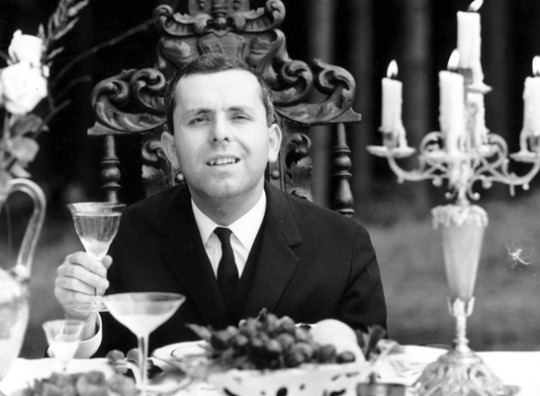
Mirek Gosney, from The University of Southampton claims that a shortcoming of the Czech New Wave was it’s ambiguous time frame, as the films equally resist the past, reflect the present, and anticipate the future. The New Wave often has become subject to sentimentalizing sixties nostalgia. Gosney explains that the New Wave also had fragmentary organization, with its filmmakers only assembling on two main occasions: once to defend Daisies (1966) and The Party and the Guests (1966) against dissension charges, and the second time to produce Pearls of the Deep (1965). Gosney felt that the New Wave was destined to remain “unfinished” because it was “evidently unrealistic to preach egalitarianisim with such a hostile political climate unless all fronts are united behind a coherent, long-term cause”. He sees The New Wave as neither reformist nor revolutionary, because the only organization it yielded was further Communist rule. This is a different take on the Czech New Wave than most other ones I have heard before.
Fernando Gomez, from the Czech Center Museum in Houston, Texas, claims that Jan Nemec’s A Report on the Party and the Guests (1966), is a direct reflection of communist Czechoslovakia’s imposing nature on its own citizens. He explained that it is also an observation of how people are willing to accept things for the way they are when they are faced with such high power. Gomez believes that although the Czech New Wave ended following the Soviet invasion, the directors’ legacy lived on through subsequent films such as Milos Forman’s One Flew Over the Cuckoo’s Nest (1975). This film contained the same anti-establishment themes as in Forman’s Czech New Wave films. Gomez finished his critique by concluding that in Czechoslovakia, the sixties were an important point in time for film history because it exposed communist Czechoslovakia to the world. He explained that they did this through works of art, daring to criticize a complacent regime full of propaganda.
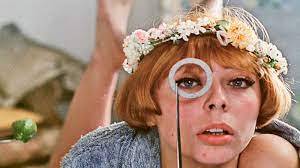
Facets co-founder, Milos Stehlik said that “some people called [The Czech New Wave] the Czech film miracle”. His reasoning for this was because this movement came out of nowhere very quickly after an era of harsh communism. Stehlik believes that there are some directors who did achieve international success, such as Jan Kadar with The Shop on Main street, and Jiri Menzel with Closely Watched Trains, both winning Academy Awards for best foreign-language film. Another film, Daisies (1966), by Vera Chytoliva was a legendary anarchic comedy that was denounced by government authorities, saying that it represented “a road of our cultural life on which no honest worker, farmer, or intellectual would like to embark”. Stehlik explains that it was a testing of limits, and a testing of rules and conventions. Many people felt the same way about this film, as it crossed boundaries people were not expecting it to.

Vera Chytoliva’s film Daisies, was a playfully subversive take on women’s roles, seeing through a jarring lens. Throughout this film, the two main characters, both girls, run around pranking older men and just laughing at the world around them. There are random jump cuts throughout Daisies, as well as abrupt switches between color and black and white. The look of this film is very different than the predictable ways of the mainstream cinema from that era in Czechoslovakia. Both of the main characters were not professional actors, but not much else in Daisies conformed to the basic Czech approach, seeing how eccentric it is. Chytoliva explained in an interview with writer Antonin J Liehm in 1967 that “we are still living as guests in a man’s world”. When she says “we”, she is referring to women. Christina Newland closes her critique saying that if what Chytoliva said was true, then the women of Daisies would be the world’s worst guests. This is because they jump on the furniture, swing from the chandeliers, and cause much more chaos. This film is like no other during this era, so it is still very fun to watch.

Trailer for Daisies:
https://youtu.be/cPpPpnVwRgY
Trailer for A Report on The Party and The Guests:
https://youtu.be/COhqThlv_04
food fight in Daisies
https://youtu.be/zm9Gh8Fpy0c
References
https://openjournals.uwaterloo.ca/index.php/kinema/article/view/1232/1554
https://www.researchgate.net/publication/333565786_The_Czechoslovak_New_Wave-_The_Golden_Sixties_or_Beginning_the_Descent_into_a_Postmodern_Abyss
https://www.czechcenter.org/blog/2021/5/17/cinema-under-communism-the-czech-new-wave
https://www.latimes.com/archives/la-xpm-2002-apr-03-et-liebenson3-story.html
https://filmlifestyle.com/czech-new-wave-cinema/
https://lwlies.com/articles/daisies-vera-chytilova-mubi-ica-light-show/
2 notes
·
View notes
Text
0 notes
Text

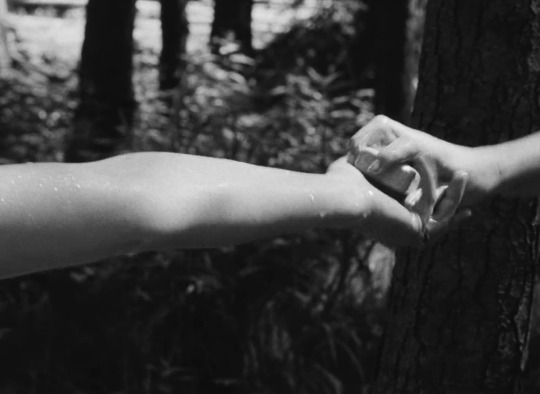
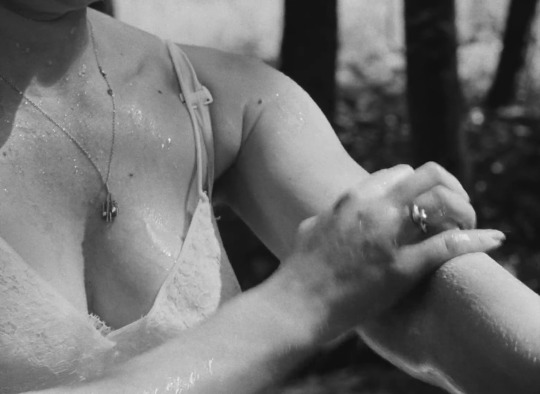




A Report on the Party and Guests (O slavnosti a hostech) - Jan Němec - 1966 - Czechoslovakia
18 notes
·
View notes
Photo
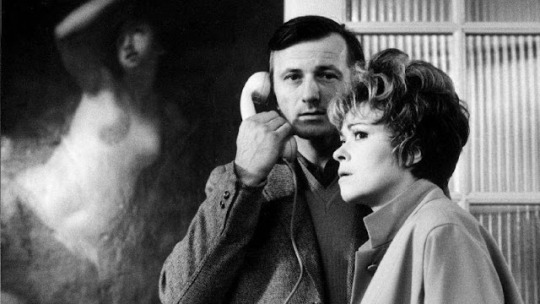
Radoslav Brzobohaty and Jirina Bohdolová in The Ear (Karel Kachyna, 1970)
Cast: Jirina Bohdalová, Radoslav Brzobohatý, Gustav Opocenský, Miroslav Holub, Lubor Tokos, Borivoj Navrátil, Jirí Císler, Jaroslav Moucka, Karel Vasicek, Ladislav Krivácek, Frantisek Nemec. Screenplay: Karel Kachyna, Jan Procházka, Ladislav Winkelhöfer. Cinematography: Josef Illík. Art direction: Oldrich Okác. Film editing: Miroslav Hájek. Music: Svatopluk Havelka.
The Ear is not only a fascinating bit of political history but also unnervingly relevant to these anxious times when a film about political paranoia can't help but touch nerves. Karel Kachyna was part of the Czech New Wave, filmmakers like Milos Forman, Ivan Passer, and Jiri Menzel who took advantage of a looser attitude toward dissent on the part of the Communist Party in mid-1960s Czechoslovakia. Unfortunately, The Ear was made toward the end of that period of relative tolerance, and it was suppressed by the government under pressure from the Soviet Union. It wasn't released until 1989, after the collapse of European communism. It turns out to be a remarkable portrait of a marriage stretched to the breaking point by political tension. Ludvik (Radoslav Brzobohatý) is a mid-level official in the Communist Party bureaucracy. He and his wife, Anna (Jirina Bohdolová) come home from a Party function one evening to discover an unlocked gate and other signs that someone has entered their house while they were away. When they also find that the phone doesn't work and the power is off, they suspect the worst: The Party has been snooping. They know the consequences well: exile or imprisonment at the least. They already suspect that their home has been bugged -- they call it "The Ear" -- all along, but figure that it was confined to their bedroom. Ludvik recalls events at the party they have attended and begins to put the worst interpretation possible on them, signs that he's about to be purged. To make matters worse, they haven't been getting along. Anna is an alcoholic and has had an affair. So as Ludvik begins trying to destroy papers that the Party might find incriminating -- burning them and flushing them down the toilet, to the point that he sets the toilet seat on fire -- Anna keeps up a steady stream of resentful accusations. Eventually, they discover that "ears" are everywhere: listening devices tucked in every nook and cranny of the house. Their rancor turns to mutual support and even affection. It turns out that Ludvik is not being purged after all: He's being promoted. But that only causes them to realize that their plight has worsened: If they were under surveillance before, how much more will they be subjected to now? The relationship of Anna and Ludvik has been compared to that of George and Martha in Who's Afraid of Virginia Woolf? but with the added political tension, and Brzobohatý and Bohdolová play it brilliantly. Cinematographer Josef Illik shoots many scenes as if lit by the candelabra Anna and Ludvik are carrying around the darkened house, creating a visual correlative for the uncertainty that surrounds the couple.
1 note
·
View note
Text
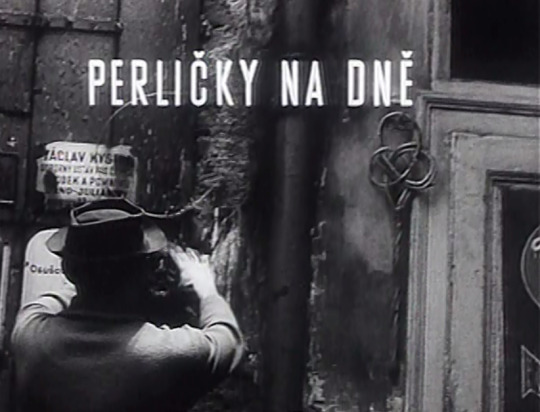
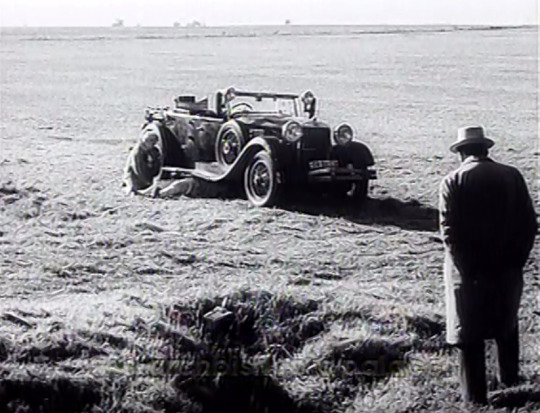

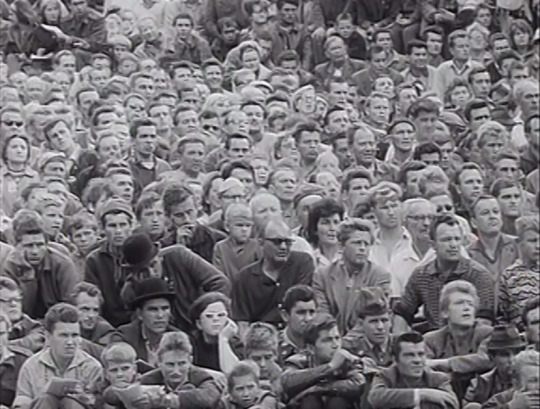
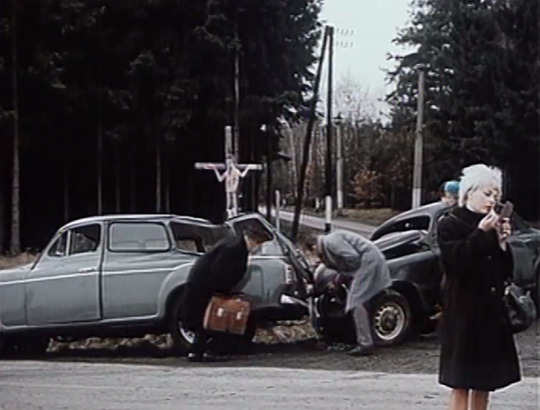


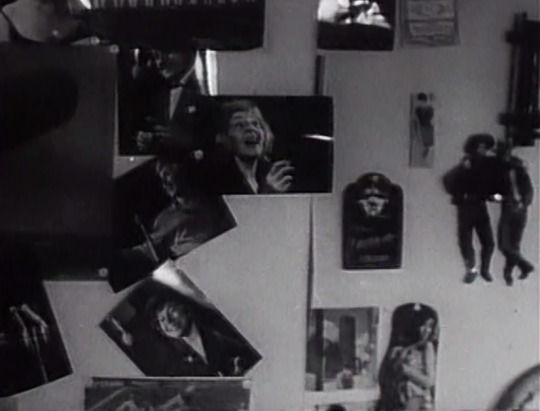
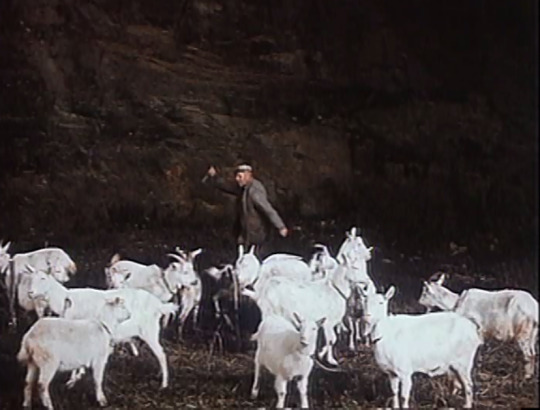




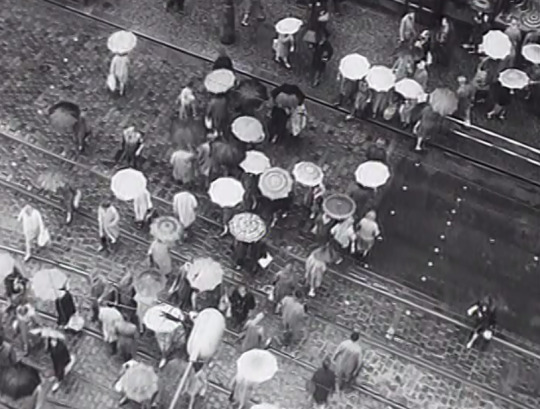

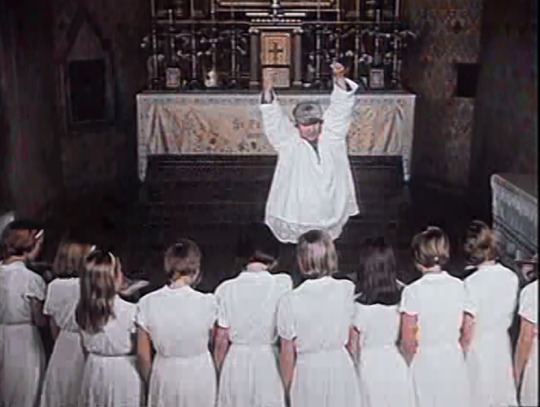

Pearls of the Deep (1966)
#pearls of the deep#bohumil hrabal#jiri menzel#vera chytilova#jaromil jireš#jan nemec#evald schorm#talks
6 notes
·
View notes
Photo

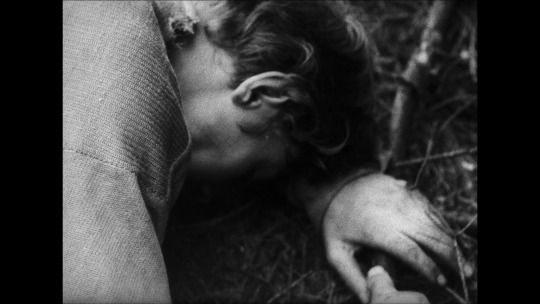

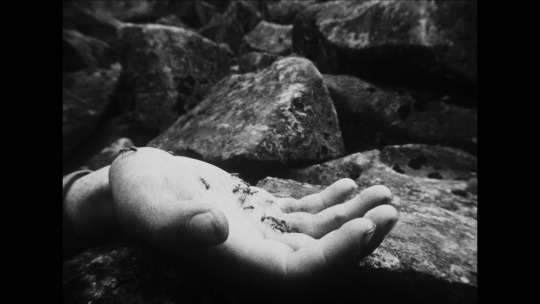
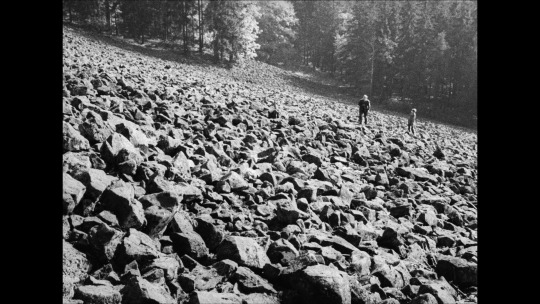


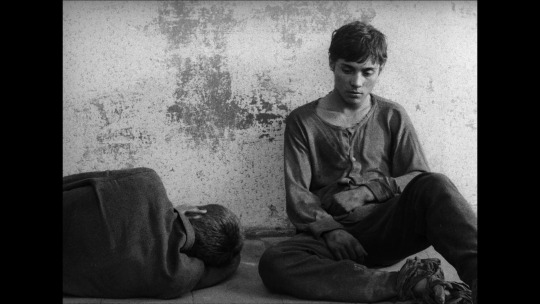

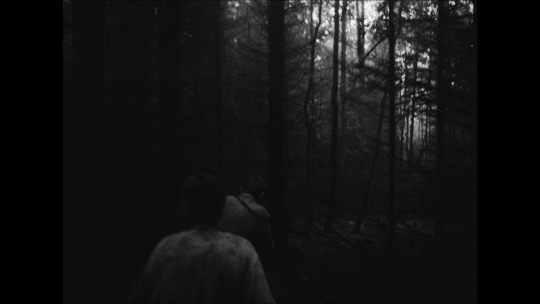
Démanty noci, 1964
Dir. Jan Nemec
5 notes
·
View notes
Photo


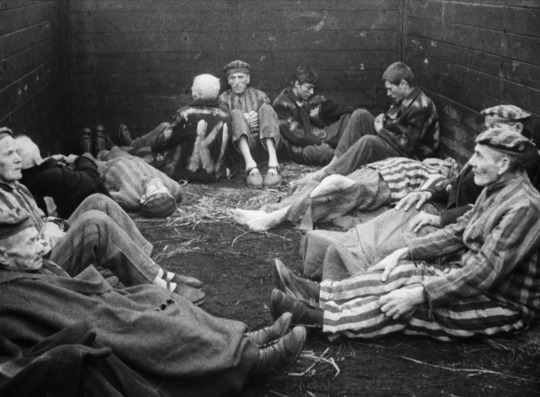


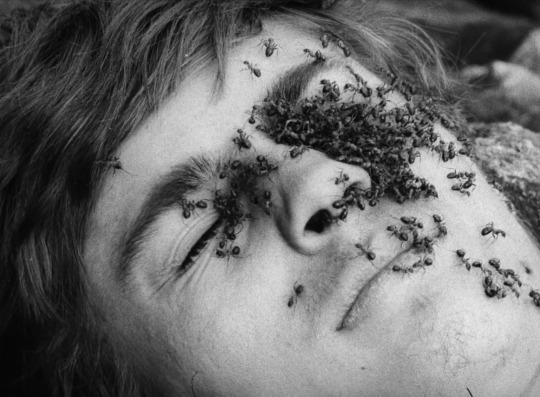
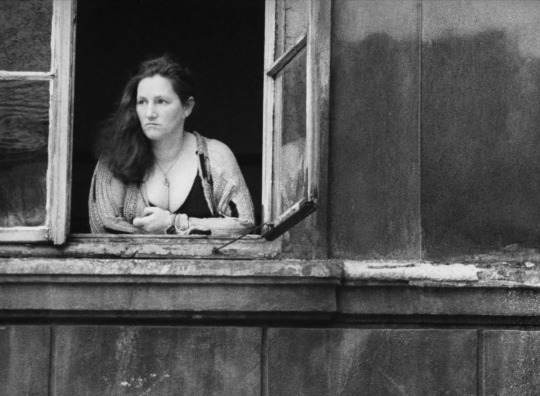
Czech New Wave 5/24
Diamonds of the Night (1964) - Jan Němec
Streut blumen der liebe bei lebens zeit, und bewahred einander vor herzenleid.
Sprinkle flowers of love during life, and save one another from heartache.
#film#cinema#cinematography#diamonds of the night#jan nemec#czech new wave#i know my translation is rough but i tried#if anyone who speaks better german can fix my translation lmk pls
21 notes
·
View notes
Text
Ein paar Veranstaltungs-Tips für "Tatort"- und Krimi-Fans aus München und Umgebung.
Donnerstag, 19.10.2023: "Mord in Bayern" mit Winfried Frey und Ludwig Waldinger; Oberbräu Holzkirchen
Sonntag, 05.11.2023: "Hochstapler" mit Jan Josef Liefers & Axel Prahl; Prinzregententheater
Mittwoch, 08.11.2023: "Mörderisches Bayern" mit Udo Wachtveitl; Münchner Künstlerhaus
Donnerstag, 18.01.2024: "Wenn Overbeck (wieder)kommt" mit Roland Jankowsky; Schlachthof
Dienstag, 24.01.2024: "Die Kraft der Musik" mit Miroslav Nemec; Münchner Künstlerhaus
Donnerstag, 15.02.2024: "Chocolat" mit Harald Krassnitzer und Ann-Kathrin Kramer
Dienstag, 09.04.2024: "Erlesene Literatur" mit Anna Loos und Jan Josef Liefers; Gasteig HP8
4 notes
·
View notes